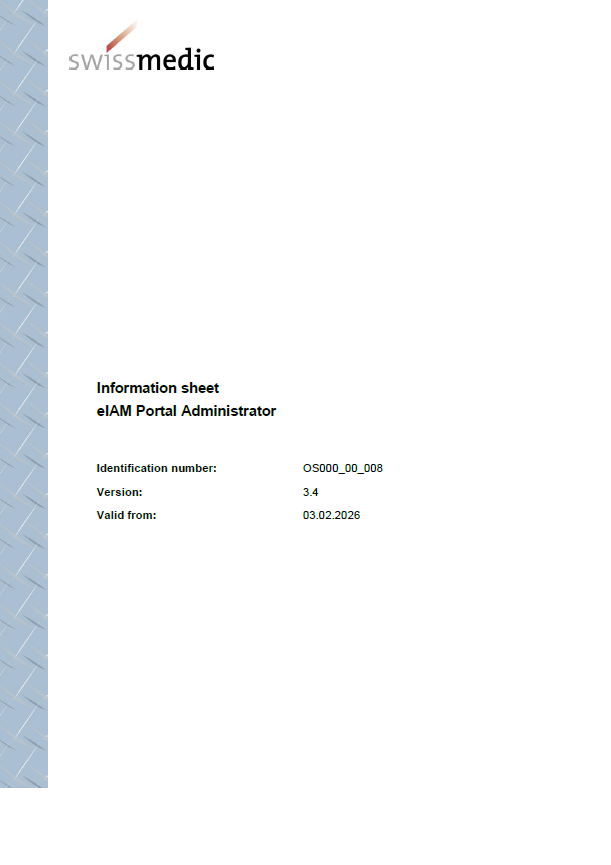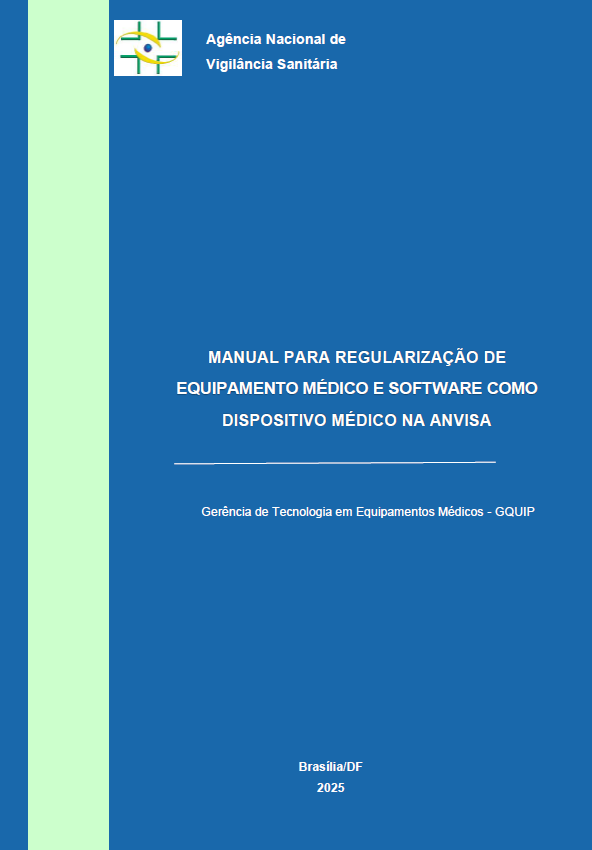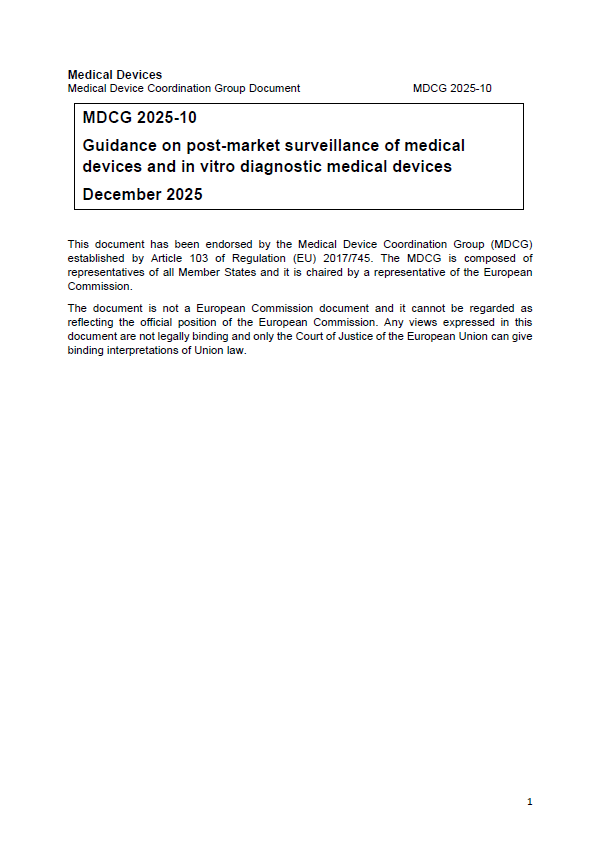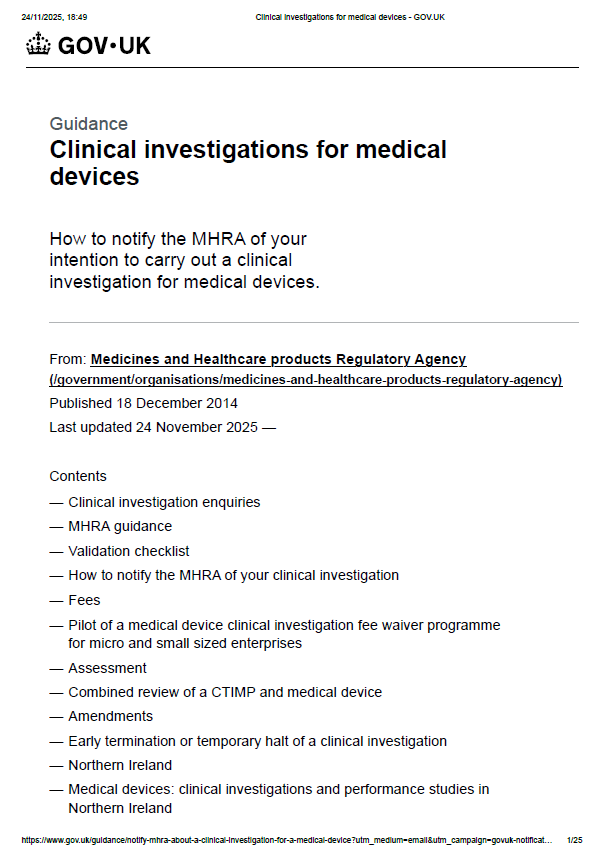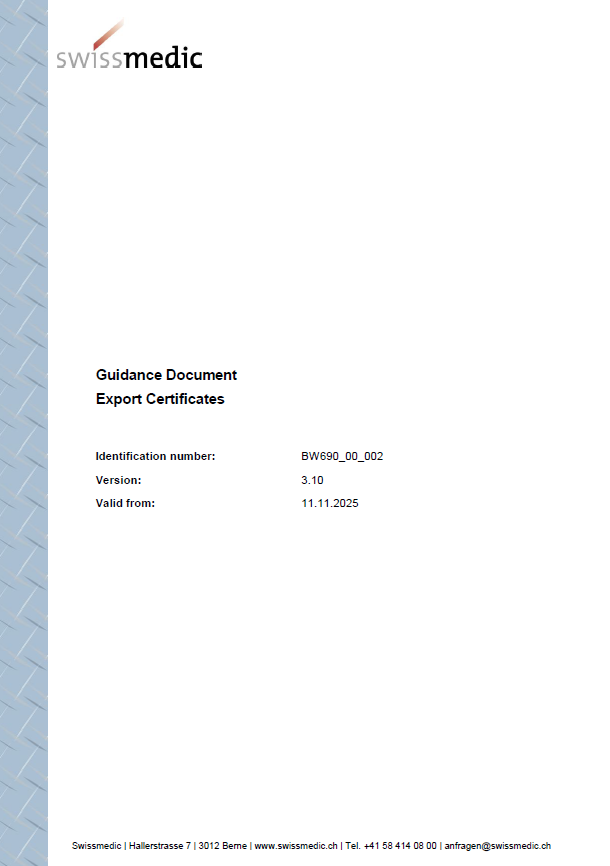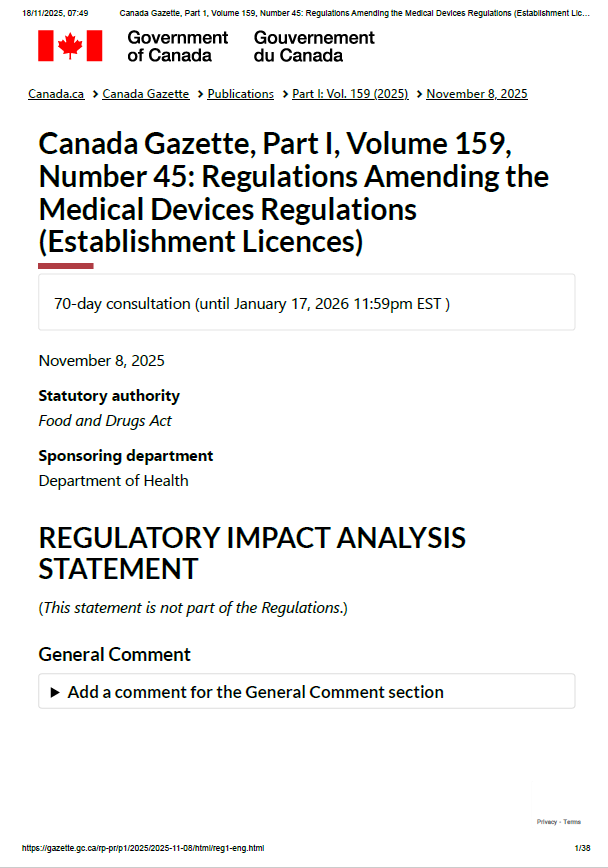Swissmedic Updates eIAM Portal Administrator Guidance – Version 3.4 Effective February 2026
Swissmedic publishes eIAM Portal Administrator guidance version 3.4, effective February 2026. Learn what this means for manufacturers using Swiss eGov services.
ANVISA publishes final version (v1.3) of the Medical Device Registration Manual – January 2026
ANVISA publishes final version (v1.3) of its Medical Device Registration Manual. See what manufacturers need to know for regulatory submissions in Brazil.
MDCG 2025-10: Strengthened expectations for PMS systems under MDR and IVDR
New MDCG guidance on post-market surveillance provides clearer operational expectations for manufacturers under MDR and IVDR. PMS plans must now be more proactive, structured, and integrated into the QMS.
Health Canada Adopts the IMDRF Table of Contents (ToC) Format for Medical Device Submissions
Health Canada has adopted the IMDRF Table of Contents (ToC) structure for medical device submissions, streamlining dossier preparation and supporting global regulatory convergence. The updated guidance outlines requirements for pre-market and post-market submissions and clarifies expectations for electronic filing, templates and documentation. Essential reading for manufacturers targeting the Canadian market.
MHRA Publishes Updated Guidance on Clinical Investigations for Medical Devices: Key Implications for Manufacturers
The MHRA has published updated guidance on clinical investigations for medical devices, detailing the requirements manufacturers must meet when planning and conducting investigations in Great Britain. The update strengthens documentation expectations, safety requirements and regulatory oversight, making it essential for all manufacturers preparing UK submissions.
European Commission Launches the Digital Fitness Check: Implications for Medical Device Manufacturers
The European Commission has launched a Call for Evidence for its Digital Fitness Check, a major evaluation of EU digital legislation and its impact on competitiveness, innovation and administrative burden. This review is particularly relevant for medical device manufacturers facing overlapping digital, cybersecurity and data compliance obligations across EU rules.
Swissmedic Updates Guidance on Export Certificates: Key Implications for Medical Device Manufacturers
Swissmedic has released updated guidance on the requirements for obtaining export certificates (Free Sales Certificates) for medical devices, introducing clearer rules for manufacturers on documentation, conformity evidence, product grouping, and submission procedures. The revised framework is essential for manufacturers exporting devices to global markets that require FSCs as part of their regulatory registration.
Health Canada Launches Phase II of the MDEL Modernization Framework: Key Impacts for Manufacturers
Health Canada has released Phase II of its Medical Device Establishment Licensing (MDEL) Modernization Framework, introducing enhanced compliance expectations, strengthened oversight of foreign manufacturers, updated documentation requirements and a stronger focus on post-market safety. These changes are essential for manufacturers exporting medical devices to Canada.
MHRA Updates Guidance on Clinical Investigations – What Manufacturers Need to Know
The MHRA has released updated guidance for clinical investigations of medical devices in the UK, outlining new requirements for manufacturers, including application validation, safety reporting, UKCA/CE/CE UKNI considerations, and updated processes for studies in Great Britain and Northern Ireland. Medical device manufacturers must review these regulatory changes to maintain compliance, ensure timely clinical investigation approvals, and prepare robust technical documentation aligned with UK and EU regulatory frameworks.
Swissmedic Reinforces Signal Management and PSUR Requirements for Veterinary Medicinal Products
Swissmedic’s updated guidance on PSUR Signal Management sets a higher standard for pharmacovigilance in Switzerland. By aligning with EU Regulation 2019/6 and VICH GL 29, it requires manufacturers to strengthen PSUR reporting, signal evaluation, and safety data traceability. For medical device and IVD producers, this shift underscores the importance of robust post-market surveillance and regulatory readiness. Smart MDR supports companies in navigating these evolving frameworks efficiently and confidently.
FDA Draft Guidance Aligns QMS Requirements with ISO 13485: What It Means for Medical Device Manufacturers
The FDA has released a draft guidance aligning U.S. Quality Management System (QMS) requirements with ISO 13485:2016. This change simplifies compliance for medical device and IVD manufacturers and distributors, ensuring global harmonization and streamlined FDA premarket submissions effective February 2026.
MHRA launches "AI Airlock": new regulatory sandbox for medical devices based on Artificial Intelligence
The AI Airlock initiative, launched by the MHRA, is an innovative regulatory sandbox designed to support the development and evaluation of Artificial Intelligence medical devices (AIaMD). This controlled regulatory environment allows manufacturers of AI-based medical technology to test compliance approaches, clinical evidence and algorithmic validation prior to formal submission. With a focus on adaptive machine learning models, algorithmic security and continuous monitoring, AI Airlock represents a strategic opportunity to accelerate market access with UKCA compliance.
MDCG 2025-4: new guidance for the secure provision of MDSW apps on online platforms
The MDCG has published guidance 2025-4, which clarifies the responsibilities of manufacturers of software as a medical device (MDSW) and operators of online platforms that make these apps available in the European Union. The guidance addresses the application of the MDR, the IVDR and the Digital Services Act (DSA), and reinforces labeling, traceability and transparency requirements. Smart MDR supports manufacturers and platforms in regulatory compliance and adaptation to the new obligations of the European digital market.
Health Canada begins canceling MDEL licenses for failure to comply with annual review
Health Canada has begun automatically canceling MDEL licenses for operators who have not complied with the mandatory annual review. The measure affects distributors and importers of medical devices in Canada and has serious consequences, such as interruption of operations, the need to resubmit license applications, and product retention.
EUDAMED: Updated Guide to Legacy Device Registration Now Available
The new EUDAMED Guide to the Registration of Legacy Medical Devices provides detailed and practical instructions for manufacturers operating under the MDD or AIMDD directives. The transition to MDR requires legacy devices to be identified with EUDAMED DI and EUDAMED ID, even in the absence of a UDI-DI. This registration in the EUDAMED database is essential to ensure regulatory compliance and maintain the placement of devices on the European market.
Coverage of MDR/IVDR Codes by Notified Bodies: June 2025 report highlights critical areas with low designation
The June 2025 report on the coverage of MDR and IVDR designation codes by notified bodies provides an updated view on the availability of designated bodies for specific categories of medical devices and in vitro diagnostic medical devices. It identifies critical areas with lower coverage, such as active implantable medical devices (codes MDA 0101 to MDA 0104) and devices originating from human tissues (MDS 1002), as well as IVDs for blood and tissue typing (codes IVR 0101 to IVR 0202). For medical device manufacturers seeking certification under Regulation (EU) 2017/745 or Regulation (EU) 2017/746, analysis of these codes is essential to plan the submission of applications to notified bodies with adequate coverage.
MHRA updates guidelines on the classification of borderline products with medical devices in the UK
The MHRA has published a new version of the guide to classifying borderline products with medical devices. This update clarifies the criteria used in the UK to determine whether or not a product is a medical device, with a direct impact on cosmetic products, food supplements and others with therapeutic claims. If you operate in this market, it is essential to review the declared purposes, clinical evidence and regulatory framework.
FDA publishes labeling recommendations for hernia mesh: focus on safety and proper device selection
The new FDA guidance proposes improvements in the labeling of surgical hernia mesh, with the aim of reducing adverse events and facilitating device selection by healthcare professionals. Among the recommended data are mesh composition, physical characteristics and mechanical properties. The initiative applies to devices specifically indicated for hernia repair and encourages manufacturers to update the labeling in their submissions to the FDA.
FDA publishes new M11 technical specification for electronic harmonized clinical protocols (CeSHarP)
The FDA's new M11 technical specification, developed within the framework of ICH, defines a structured and harmonized electronic template for clinical protocols - CeSHarP. This document promotes the international standardization of clinical trial documentation, facilitating electronic submission and regulatory interoperability between agencies such as the FDA, EMA and PMDA.
FDA publishes draft guidance on the transfer of 510(k) clearances: clarifications on obligations, registration and labeling
The FDA has published a new draft guidance on the transfer of 510(k) clearances, focusing on situations that do not require a new submission but do require compliance with registration, device listing and labeling update requirements. The document clarifies that the new holder must register in the FURLS/DRLM system, ensure that the 510(k) number is correctly associated with their name, and comply with UDI requirements.
